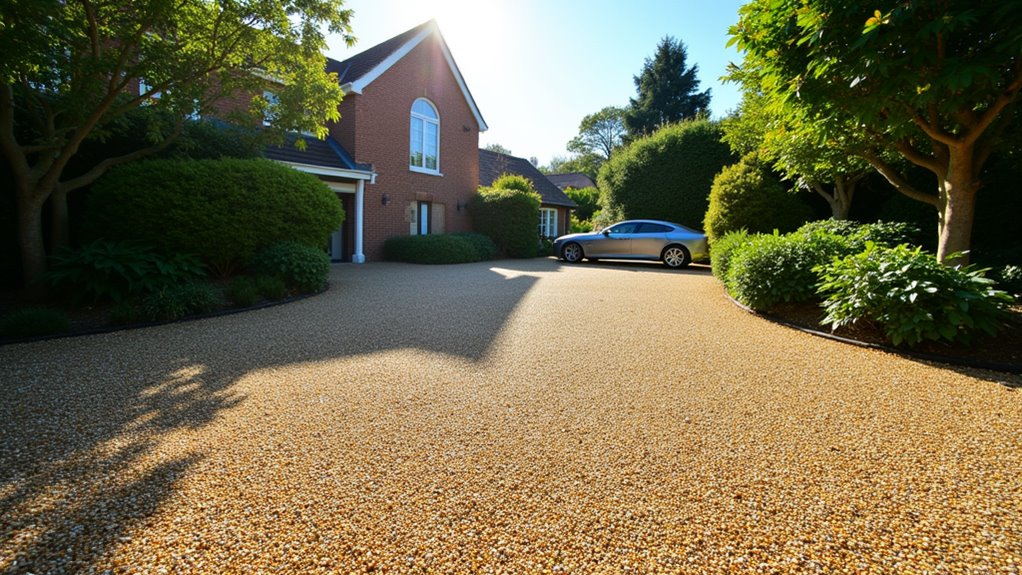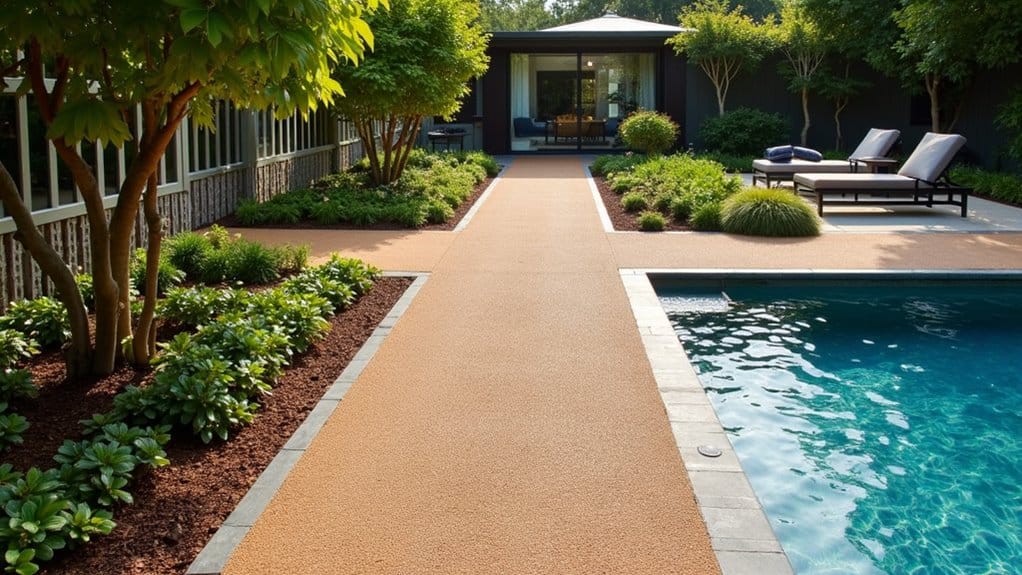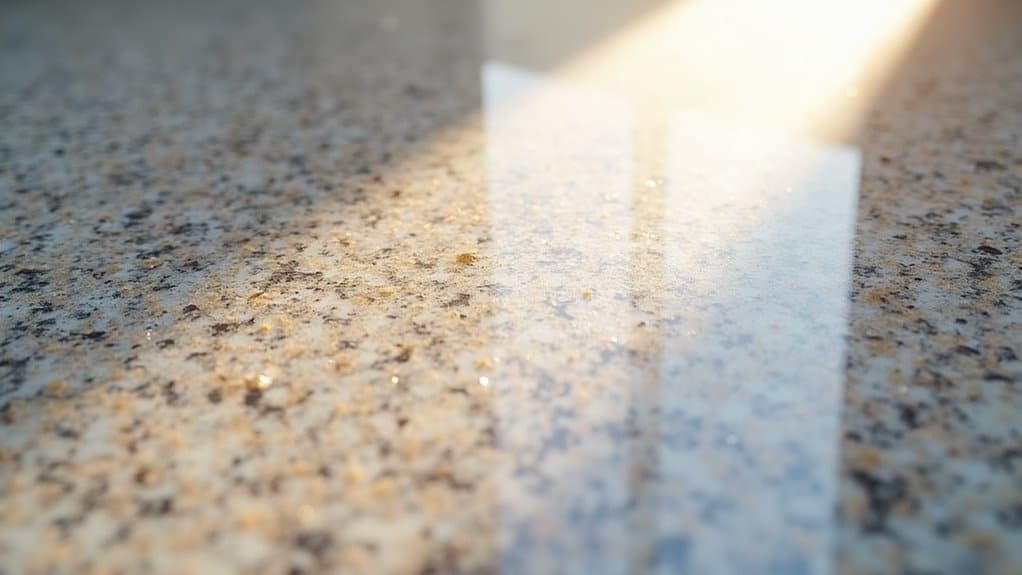A resin bound gravel driveway typically costs between £110 and £190 per square metre. The total price will vary based on factors like the size of the driveway, the quality of materials used, and how complex the installation is. For smaller driveways, you might see higher costs per square metre due to fixed expenses. For example, a small area could set you back around £1,500 to £2,500, while larger projects might exceed £9,500.
Location also plays a role, as urban areas generally have higher prices. Hiring skilled professionals is essential for a proper installation, which will improve the driveway’s longevity and performance. By exploring different options, you can find a balance between aesthetics and budget for your new driveway.
Table of Contents
ToggleKey Takeaways
Resin bound gravel driveways generally cost between £120 and £190 per square metre, which includes both materials and labour. The material costs for resin bound products range from £20 to £30 per square metre, depending on the quality you choose. Installation labour typically adds another £20 to £30 per square metre to your total.
For smaller driveways, say up to 20 square metres, you can expect to pay between £1,500 and £2,500. Larger driveways can easily exceed £9,500. Keep in mind that custom features and your location can greatly affect the final price of your resin bound gravel driveway.
Factors Influencing Driveway Costs
When planning a resin bound gravel driveway, several key factors influence the overall costs. The size of your driveway is crucial; larger areas need more materials and labour, which increases the price. Costs are generally calculated per square metre, so accurate measurements are vital. Additionally, the quality of materials used can significantly impact the final cost.
While smaller driveways might appear cheaper, they often have a higher cost per square metre due to fixed expenses. The depth of the resin layer also matters. A standard depth of 15-18mm is usually adequate for most residential uses, but areas with heavy traffic may require thicker layers, which will raise costs. This is important because the chosen resin type will affect the overall durability and performance of the driveway.
Furthermore, extensive preparation work, such as excavation or sub-base installation, can add to your budget. If the existing surface is already in good condition, it may help reduce costs.
Finally, think about any additional features you want. Borders, custom designs, or patterns can significantly increase your total expenses. While these elements enhance the look and longevity of your driveway, they also come with a greater environmental impact due to the extra materials used.
Types of Resin Options
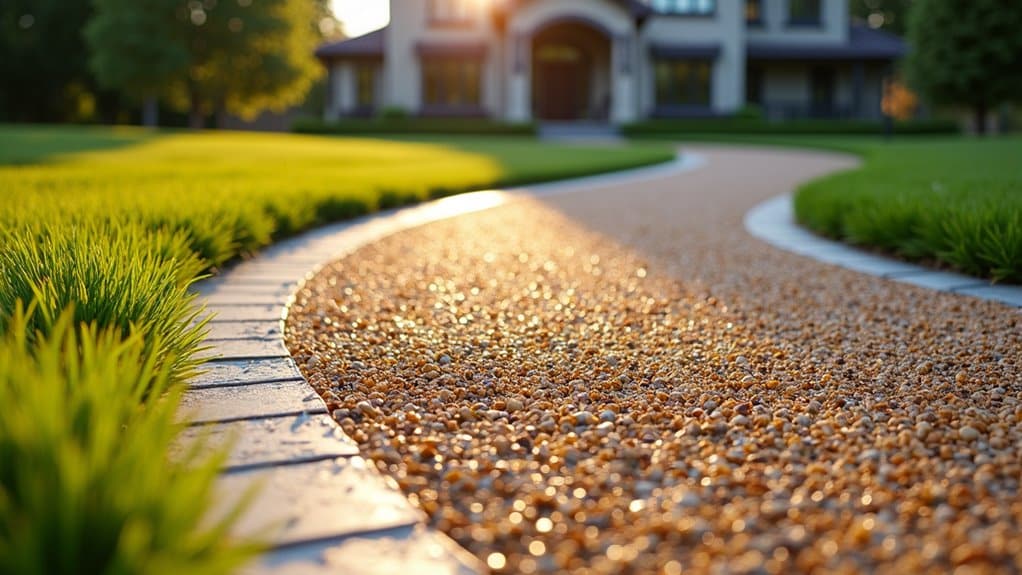
Selecting the right resin for your driveway is essential for both durability and visual appeal. You’ll primarily choose between two types: polyurethane and epoxy.
Polyurethane offers flexibility and UV resistance, making it well-suited for outdoor applications. In contrast, epoxy is more rigid but provides excellent bonding properties, making it suitable for various surfaces. The long-lasting performance of these resins is crucial for maintaining an attractive driveway over time.
The choice of aggregate is crucial for the performance and appearance of your resin-bound driveway. Combining natural aggregates, such as gravel or stone, with clear resin can enhance bonding and drainage. The smooth finish of resin-bound driveways also contributes to their safety and user experience.
You can opt for clear or coloured finishes to personalise your driveway to complement your home. Typically, the minimum installation depth is 18mm, which may vary based on the aggregate size, ranging from 12mm to 24mm. Ensure the surface is properly prepared, repairing any minor cracks before application. An attractive driveway can significantly enhance curb appeal and improve the overall look of your property.
You might also consider an anti-slip coating for added traction in wet conditions. Additionally, the total project cost for a resin-bound gravel driveway can range from $5,637 to $7,806, depending on various factors. By making informed choices about resin types and aggregates, you can achieve a beautiful and durable driveway.
Size of Your Driveway
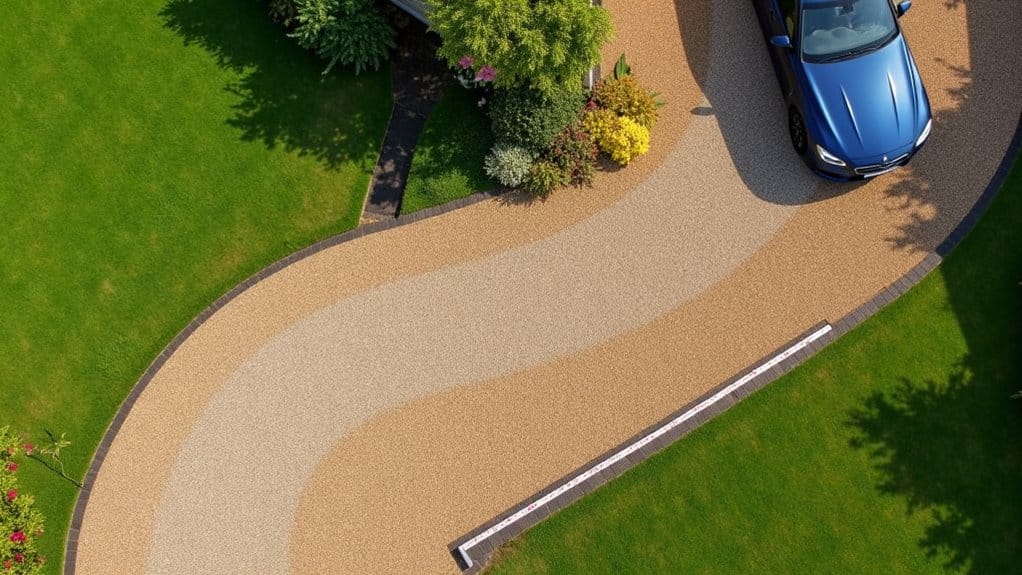
When planning your resin bound gravel driveway, accurate measurements are crucial, as they directly impact your overall costs. The price per square metre can vary significantly depending on the size of the area you’re covering. For instance, a smaller driveway may cost less overall, but the price per square metre could be higher compared to a larger area. Knowing these dimensions ensures you get the best value for your investment and helps you avoid any unexpected expenses. Additionally, the cost of materials, specifically resin and aggregate, can significantly influence the overall budget based on the driveway’s size. A well-installed resin driveway can offer long-term value due to its durability and low maintenance requirements.
Measurement Accuracy Importance
Accurate measurements are vital for determining the size of your driveway. Even small inaccuracies can lead to material waste and increased costs. To ensure precision, consider using tools like the Moasure ONE, which uses motion-sensor technology to simplify measuring complex areas, capturing every curve and angle with ease. This device’s high accuracy makes it particularly suitable for professional use, ensuring that every measurement counts.
Before you begin, clear any obstructions and define the driveway boundaries. Start with the Moasure ONE at your designated point and move along the perimeter, adjusting for any elevation changes. The accompanying app calculates the total area based on your perimeter data, making it easy to break down complex shapes.
Double-checking your measurements is essential to catch any errors that could impact your project. By prioritising accurate measurements, you minimise waste and improve efficiency, leading to quicker project completion.
Cost Per Square Meter
Once you’ve measured your driveway, understanding the cost per square metre is crucial for budgeting your resin bound gravel project. Generally, costs range from £120 to £190 per square metre, influenced by several factors.
Here’s a quick overview:
- Resin Quality: Higher-quality resins may cost more but offer greater durability.
- Aggregate Choice: Unique aggregates can improve appearance but might raise material costs.
- Driveway Size: Larger driveways need more materials and labour, affecting the total price.
- Custom Features: Extras like borders or patterns can significantly increase your budget.
Materials typically cost between £40-£70 per square metre, while labour adds another £50-£70. Proper drainage is essential to prevent damage and can add additional costs to your project.
It’s essential to weigh your options to balance quality with your budget. Investing in a durable resin and well-chosen aggregates can pay off, ensuring your driveway stays attractive and functional for years.
Before starting your project, consider these factors to make informed decisions about your resin bound gravel driveway.
Base Preparation Requirements
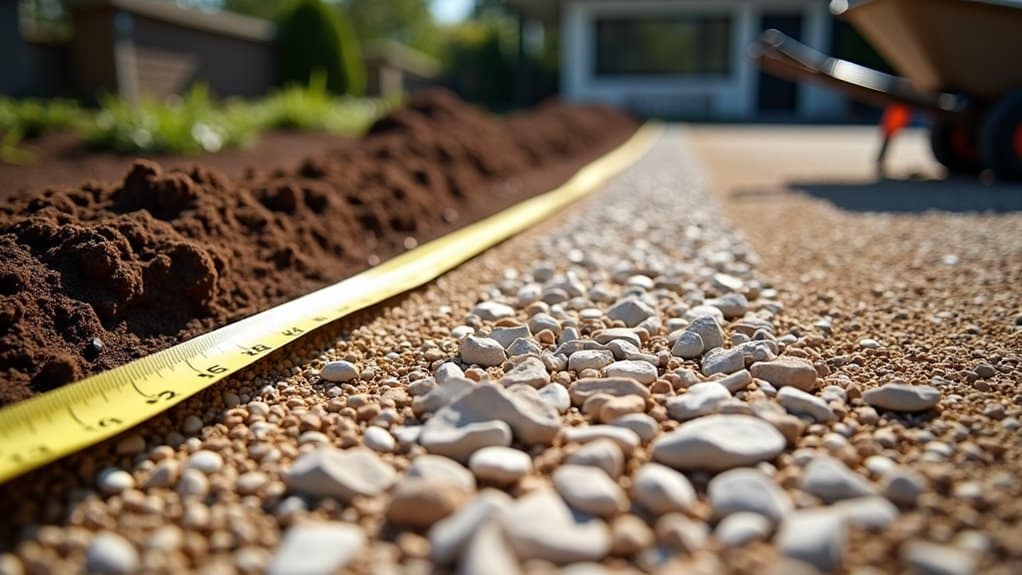
When preparing the base for your resin bound gravel driveway, it’s crucial to focus on excavation and the installation of a robust sub-base. This ensures a solid foundation. Additionally, using a polyurethane resin in the mixture will enhance the driveway’s durability and flexibility. Don’t forget to incorporate effective drainage solutions to avoid future issues that could damage the surface. Skipping these steps can lead to expensive repairs later on, so it’s important to get it right from the outset.
Excavation and Sub-base Installation
Preparing the base for a resin bound gravel driveway requires careful excavation and sub-base installation to ensure stability and durability. Here’s what you need to know:
- Excavation Depth: Aim for a depth of around 150mm to provide adequate support.
- Surface Removal: Clear away unsuitable materials like block paving or soft soil, as these won’t give your driveway the stability it requires.
- Compaction: Use a plate compactor to ensure the sub-base materials are firmly packed down for a solid base.
- Material Choices: Opt for sub-base materials such as concrete, tarmac, or compacted Type 3 aggregate. Avoid block paving, as it can lead to instability. Suitable bases include macadam, asphalt, and concrete to ensure a durable driving surface.
Before you lay the resin bound surface, check for cracks and tree roots, and make sure to clean the base thoroughly.
Fix any imperfections to create a reliable foundation. Proper preparation enhances the appearance and lifespan of your driveway, making it a worthwhile investment.
Drainage Considerations and Solutions
After laying a solid base, it’s crucial to consider drainage for the longevity and performance of your resin bound gravel driveway.
Choosing the right base material—such as macadam, asphalt, or concrete—is key for effective drainage. Steer clear of unsuitable materials like block paving, soil, or grass, as they can lead to instability.
Resin bound driveways are designed to be permeable, allowing rainwater to pass through, which makes them compliant with Sustainable Drainage Systems (SuDS) regulations.
For optimal permeability, select the right aggregate size; a 12mm aggregate is ideal for foot traffic, while larger aggregates are better for vehicles.
If your existing base has cracks or is crumbling, it will need repair or replacement.
Installing channel drainage can improve water management, keeping your driveway functional during heavy rain.
Also, check for nearby trees, as their roots can disturb the driveway’s structure.
Aggregate Quality Considerations
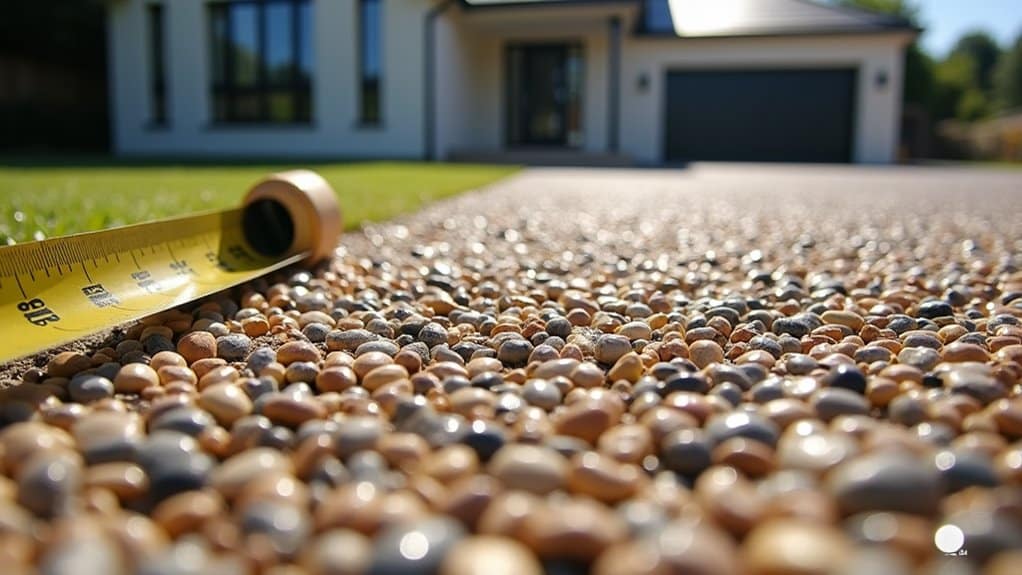
Choosing the right aggregate is crucial for a successful resin bound gravel driveway. The quality of your aggregate affects durability, appearance, and drainage. Here are four key considerations to keep in mind:
- Aggregate Sourcing: Use locally sourced materials to reduce environmental impact.
- Texture Matters: Ensure the texture and size of the aggregate enhance both performance and looks.
- Colour Options: Choose aggregates with colour variations that fit your design vision for a welcoming finish.
- Durability Check: Evaluate the durability of the aggregates to ensure they’ll stand the test of time.
Consider adding anti-slip materials like crushed glass or coarse sand for added safety. A mix of 2-5mm and 1-3mm gravel not only aids drainage but also enhances the overall aesthetic of your driveway.
Labor Cost Breakdown
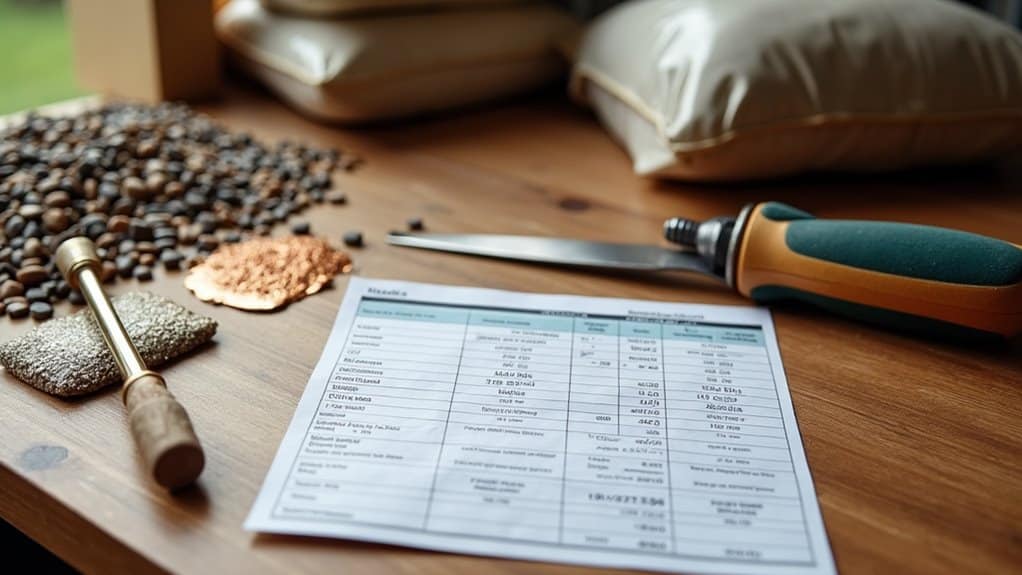
When planning your resin bound gravel driveway, it’s important to consider variations in labour rates.
The complexity of the installation can significantly affect your overall costs. For instance, if you choose an intricate design or have difficult site conditions, it will likely require more skilled labour and time.
Labor Rate Variations
Labour rate variations can significantly affect the total cost of installing a resin bound gravel driveway, so it’s important to understand the factors that influence these rates.
Being aware of these elements can save you time and money when selecting a contractor.
- Project Size: Larger projects typically demand more labour hours, which can increase costs.
- Location: Labour rates can vary greatly depending on your geographical area.
- Site Accessibility: If your site is hard to reach, additional labour may be needed, raising costs.
- Contractor Differences: Not all contractors have the same pricing; comparing quotes can help you find the best deal.
When planning your resin bound driveway, expect labour costs to range from £11.91 to £16.43 per square foot, depending on your project’s specifics.
It’s wise to obtain multiple quotes to identify the best rate.
Installation Complexity Impact
Understanding variations in labour rates is key to appreciating how installation complexity can affect costs. For instance, installing a resin bound gravel driveway involves specific techniques that can significantly increase labour expenses.
Firstly, pre-installation checks are essential. Professionals must assess whether the surface is suitable, ensuring it’s clean and free from moisture, while also examining the base for stability and any damage. This groundwork is vital for successful installation.
Next, base preparation presents its own challenges. Excavating existing surfaces and ensuring they’re level requires skilled labour to confirm that the right base materials—whether new concrete or existing asphalt—are used.
Material mixing and application also require precision. It’s crucial to mix the resin and aggregates properly for a uniform finish, using specialised tools. Trowelling and floating the mixture necessitate skill, and in cooler weather, a catalyst may be needed.
Finally, post-installation tasks such as cleaning and applying anti-slip coatings are important for both durability and aesthetics. Each phase adds to the overall labour costs, highlighting the complexity of the installation process.
Material Cost Overview
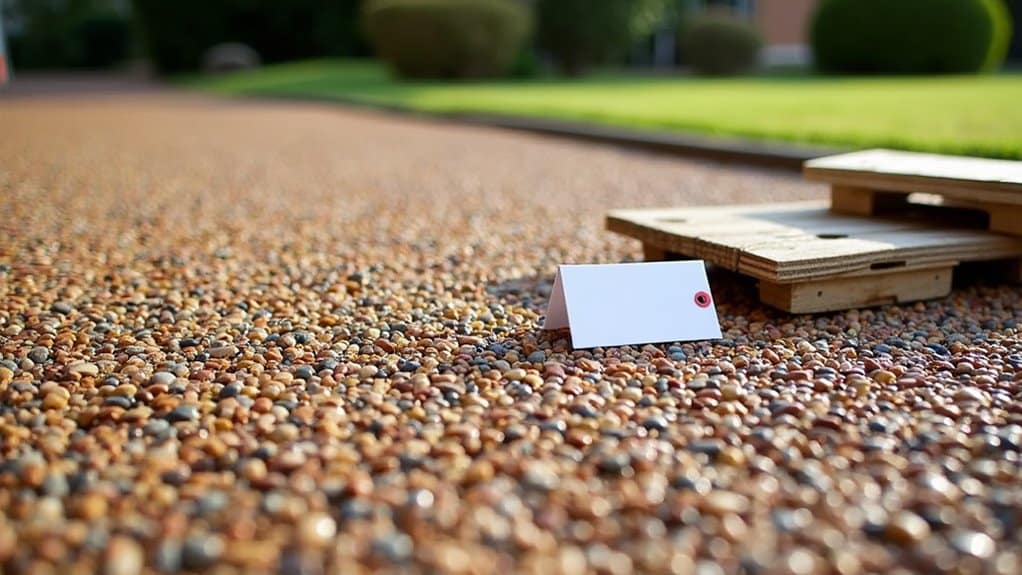
Material costs for a resin bound gravel driveway can vary significantly based on a few key factors.
Here’s a concise overview of what influences these expenses:
- Material Type: Resin bound materials typically cost between £20 and £30 per square metre. However, opting for higher-quality aggregates or custom colours can increase this price.
- Installation Methods: When installation is included, the cost can rise to £40-60 per square metre, largely depending on the project’s complexity.
- Existing Surface Condition: If your current driveway requires base preparation, such as cracked concrete overlays, costs can jump to around £70 per square metre.
- Design Customisation: Custom designs or scenarios involving heavy vehicle traffic may necessitate thicker materials, further elevating your overall cost.
On average, you can expect to pay between £110 and £150 per square metre for a resin bound driveway, factoring in all these elements.
Remember, additional costs for labour and base preparation will also impact your total expenditure.
Depth of Resin Layer

The depth of the resin layer is crucial for the longevity and durability of your driveway. A minimum thickness of 16mm is advisable to ensure stability and prevent cracking.
Depending on the size of the aggregate and the expected usage, this depth may need to be increased. For instance, if your aggregate size is between 3mm and 6mm, aim for at least 18mm of resin.
If you expect heavy traffic—particularly from vehicles over 7.5 tonnes or those needing to turn—you should consider depths of 18mm or more.
Shallow resin layers can deteriorate quickly, leading to expensive repairs. Additionally, the quality of your base is vital; a well-prepared base enhances stability and performance.
Customization and Aesthetic Costs
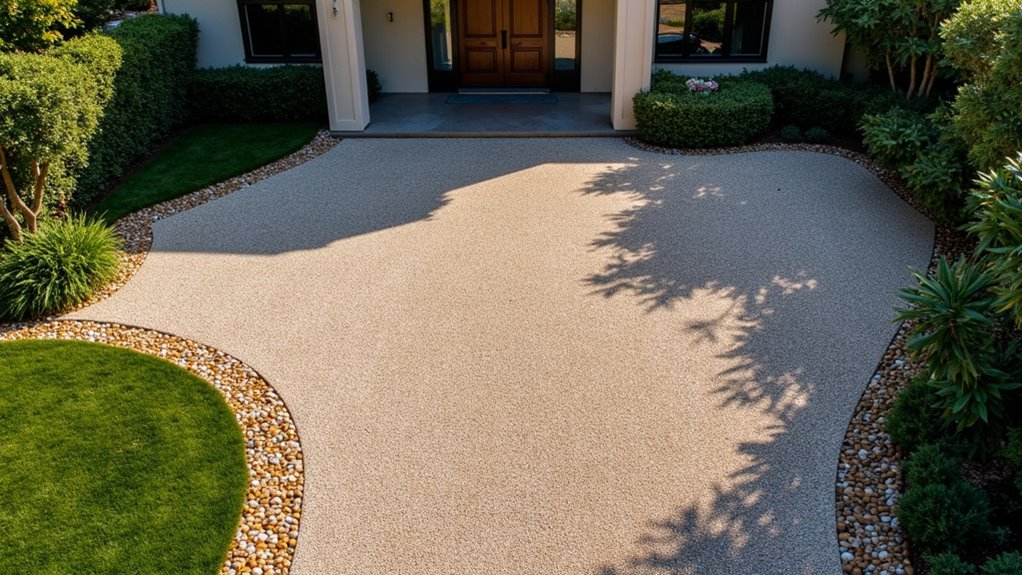
Once you’ve laid a solid resin layer, consider how customization can enhance your driveway’s look and usability. Customising not only boosts curb appeal but also reflects your personal style.
Here are some key factors to think about:
- Colour Options: Choosing unique colours can transform your driveway, making it stand out.
- Design Trends: Incorporating modern design elements, like geometric patterns or mixed materials, can give your driveway a contemporary feel.
- Additional Features: Anti-slip coatings improve safety and enhance visual appeal.
- Thickness Variation: Selecting different thicknesses based on the type of traffic can influence both performance and appearance.
Be aware that these customisation options will increase your overall costs. Higher-quality aggregates and specialised designs can significantly raise material expenses, so consider your options carefully.
Investing in customisation will result in a driveway that isn’t only functional but also a striking feature of your home.
Professional Installation Importance
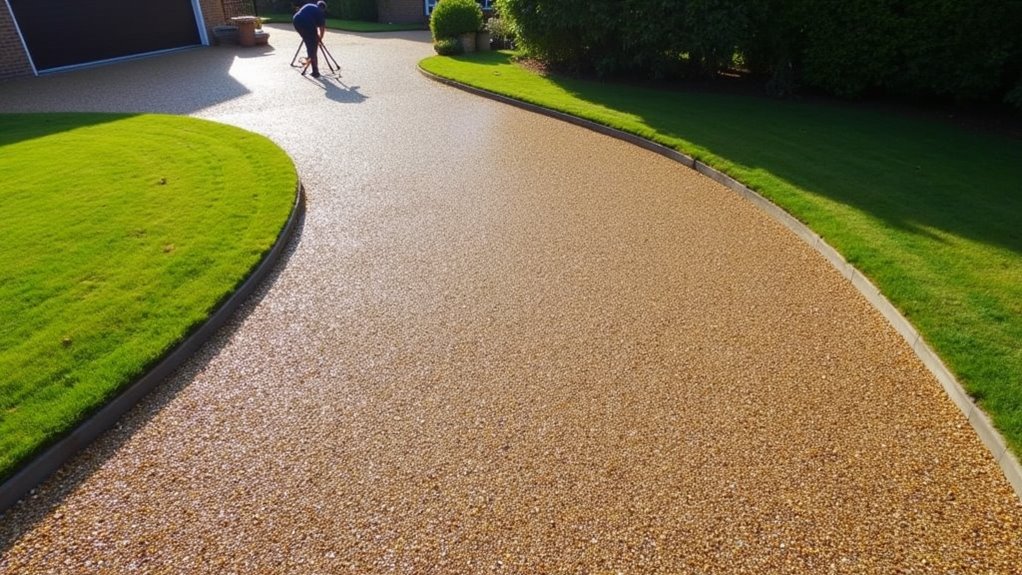
How important is professional installation for your resin bound gravel driveway? It’s crucial for achieving the best results.
Skilled professionals ensure your driveway not only looks good but also lasts longer, saving you from expensive repairs later on. By using the right materials and techniques, they help prevent the premature wear and tear that can come from poor installation.
Experts stress the need for a solid base, such as concrete or tarmac, and a clean, dry area before installation. They also highlight the importance of correct mixing ratios and layer depth to ensure durability.
Certified installers know how to manage these factors and comply with SUDS regulations, which help prevent flooding.
Additionally, professional installation means your driveway can handle heavy traffic and varying weather conditions. By getting it done right, you reduce the risk of issues like cracking or potholing, ensuring your driveway remains stable over time.
With UV-stable resin, your driveway will retain its appearance throughout the year, making the investment in professional installation worthwhile for long-lasting performance and peace of mind.
Average Cost Estimates
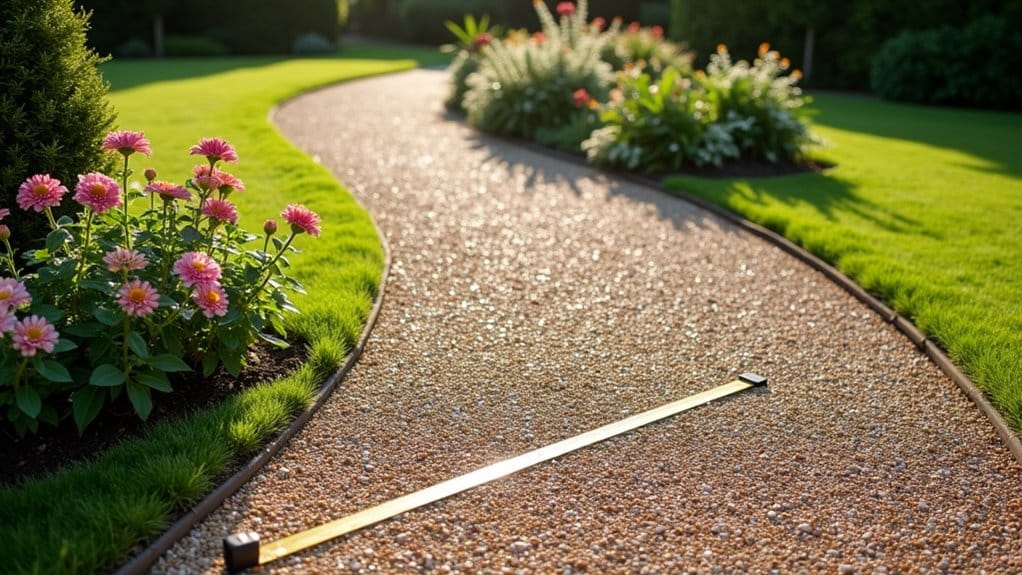
When planning a resin bound gravel driveway, it’s essential to understand the average costs involved for effective budgeting. Here’s a concise breakdown:
- Material Costs: Expect to pay between £40 and £70 per square metre for materials, which includes a resin bound kit priced at £25 to £40.
- Labour Costs: Professional installation usually ranges from £20 to £30 per square metre, depending on how complex your project is.
- Size Considerations: For a small driveway (up to 20 square metres), costs may range from £1,500 to £2,500. Larger driveways can exceed £9,500.
- Additional Features: Custom patterns or borders can significantly increase your total costs, often requiring extra labour.
Keep in mind that factors such as size, depth of the resin layer, and the condition of the existing base will affect the final price.
For example, if extensive preparation is needed, costs can climb to £70 per square metre.
Understanding these estimates will help you make informed decisions that fit your budget and design preferences.
Geographic Cost Variations
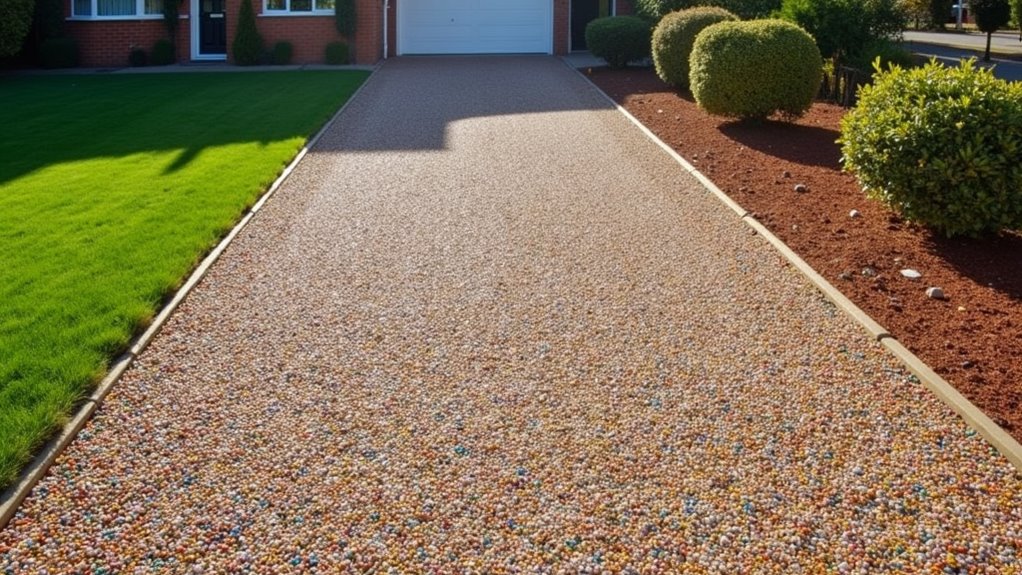
Geographic cost variations significantly affect the price of a resin bound gravel driveway in the UK. Regional pricing can greatly influence your project’s total cost.
For instance, urban areas tend to have higher material costs than rural ones due to transportation expenses and supply chain factors. If you source aggregates from local suppliers, you may find more competitive prices compared to national firms, especially in busy locations.
Labour costs also vary with regional wage rates and the local cost of living. Contractors in cities often charge more due to their overheads, while those in rural areas typically offer lower rates. For intricate designs, skilled labour can be pricier in certain regions.
Accessibility plays a role too; remote sites may incur extra transport charges, while urban areas might face stricter regulations that can increase costs.
The number of local contractors affects pricing as well. In competitive areas, prices may decrease, whereas high demand in sought-after locations might drive costs up.
Being aware of these geographic cost variations is essential for effectively budgeting your resin bound gravel driveway.
Cost-Saving Tips and Considerations
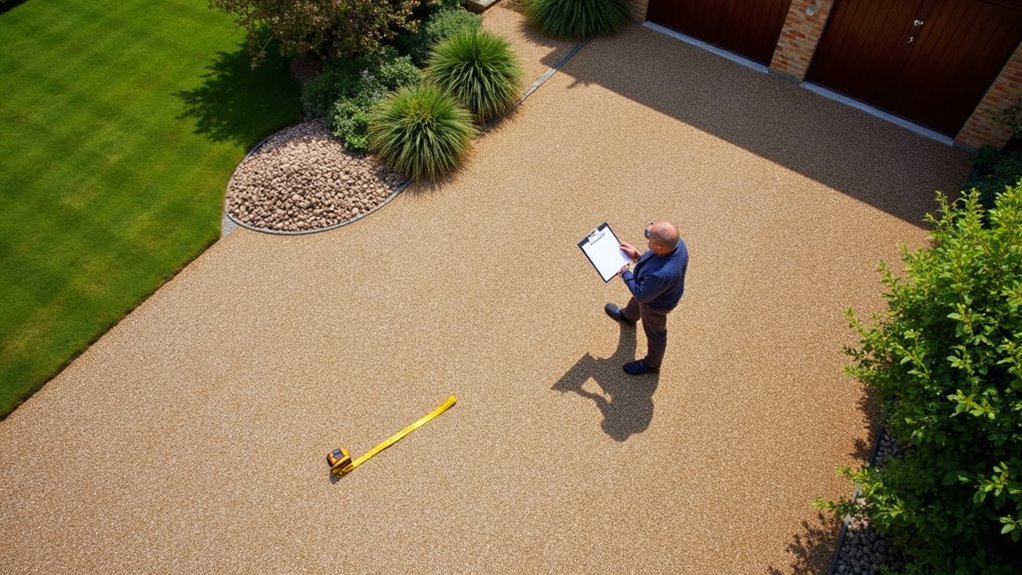
Cost-saving tips can significantly lower the expenses of your resin bound gravel driveway project.
Here are four straightforward considerations to help you save money:
- Overlay Existing Base: If you have a sturdy tarmac or concrete surface, overlaying it can reduce preparation costs.
- Choose Non-UV Resin: Non-UV stable resin is more affordable, but be aware it may discolour over time.
- Minimise Preparation: Utilise any existing solid surfaces to limit groundwork, saving you both time and money.
- Compare Quotes: Always obtain multiple quotes from contractors to ensure you’re getting the best price.
Frequently Asked Questions
How Long Does a Resin Bound Driveway Typically Last?
A resin bound driveway usually lasts between 15 to 25 years, influenced by factors such as the quality of installation and ongoing maintenance. By knowing what to expect in terms of lifespan, you can ensure your investment stays attractive and functional for many years. Regular upkeep, like clearing debris and resealing when necessary, can help maximise its longevity.
Can I Install a Resin Driveway Myself?
If you have a steady hand and a bit of creativity, you can install a resin driveway yourself. However, keep in mind that material costs can quickly add up, so it’s wise to plan your budget carefully before starting the project.
What Maintenance Is Required for Resin Driveways?
To maintain your resin driveway, regular cleaning is essential. Sweep it regularly and give it a wash once a month. If you notice any stains, tackle them quickly. For a more thorough inspection and resealing, consider hiring a professional every few years.
Are Resin Driveways Suitable for Heavy Vehicles?
Yes, resin driveways can support heavy vehicles, with a load bearing capacity of up to 7.5 tonnes. When designed with the appropriate aggregate and base, they effectively handle the weight of vehicles like vans and larger cars while remaining durable and resistant to cracking.
How Does Weather Affect Resin Driveway Installation?
Weather plays a significant role in the installation of resin driveways. It’s essential to consider temperature, as it affects the curing process. For instance, if it’s too cold, the resin may not set properly, leading to adhesion problems. Similarly, high humidity or rain can cause complications, such as a tacky surface or uneven finishes.
Extreme weather conditions can delay your project, so it’s crucial to plan your installation during milder periods. Ideally, aim for dry days with temperatures between 10°C and 25°C for the best results. Always check the forecast before starting to ensure a smooth installation process.
Conclusion
Investing in a resin bound gravel driveway is an excellent way to enhance your home’s curb appeal. To navigate the costs, consider the size of the driveway, the quality of the aggregate, and whether you’ll hire professionals for installation. Prices can vary across the UK, so it’s wise to plan ahead and look for cost-effective options. This investment not only improves your property’s appearance but can also increase its value.
Prepare the perfect base for your resin bound stone installation and discover the crucial factors that ensure lasting durability.
Know where resin bound surfacing can transform spaces for both residential and commercial use, and discover the countless benefits that Read more
A stone carpet combines beauty and resilience in flooring, but what makes quartz floors uniquely beneficial? Discover the secrets behind Read more

